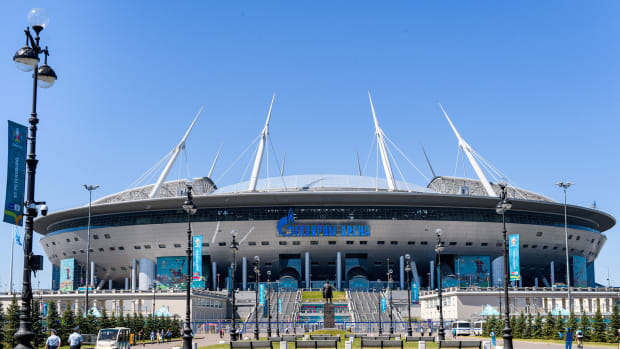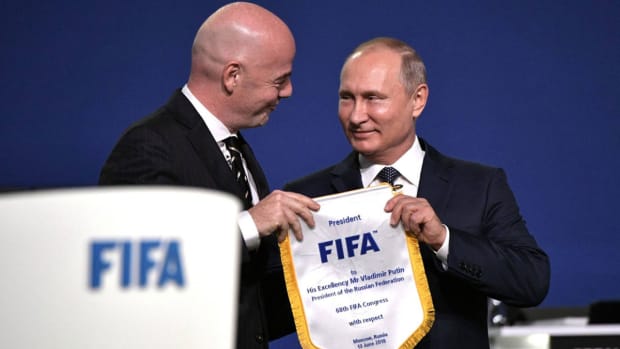UEFA and FIFA find themselves confronting the nexus of geopolitics and global football’s showpiece events.
Geopolitics and global football often find themselves intertwined, and current events have once again brought the two into the same space—with multiple layers.
UEFA is seriously considering moving this season’s Champions League final away from St. Petersburg as Russian aggression in Ukraine escalates. Emergency talks were held on Tuesday, but it may not be until after the quarterfinals that a final decision on the venue is taken.
COVID-19 forced the final to be moved from Istanbul in each of the last two seasons, and a third successive switch is something UEFA desperately wanted to avoid. But it has become apparent that its Western members could not countenance taking part in an event that would be seen as a soft-power triumph for Vladimir Putin’s government if Russia launches a wholesale invasion of Ukraine's eastern regions.

Bildbyran/Imago Images
There are those who point out that the 2003 Champions League final was played in Manchester shortly after the invasion of Iraq by U.S. and U.K. forces, and, whatever personal feelings about the legitimacy of the two conflicts, it’s understandable that UEFA should be reluctant to arbitrate on what sort of military action is legitimate. What makes this different, though, is that the country being invaded is itself a UEFA nation that is supported by a majority of UEFA members. It’s inconceivable that fans from Western Europe could travel to Russia for the game.
There has already been some spillover from geopolitics into the Champions League (beyond the years-old procedural step of ensuring Russian and Ukrainian clubs are kept apart in the draw). On Tuesday, Manchester United canceled its flight to Spain to face Atlético Madrid with its own official carrier, Russian airline Aeroflot.
While moving the final late in the past two seasons has undoubtedly reduced the sense of spectacle, it has also demonstrated that it can be done and that reduces the sense of urgency for UEFA. It is keen to avoid either one club in the final effectively playing at home, whether in its own city or stadium, or for two clubs from the same country to qualify and their fans then having to travel the width of the continent for the game. Nobody wants, for instance, a Manchester City vs. Manchester United final in Baku, but equally UEFA would prefer not to have, say, Real Madrid playing Bayern Munich at the Bernabéu.
Budapest would seem to offer a straightforward solution in that it is central, has a modern and finely appointed stadium and has stepped in at short notice to host games in the recent past, but Hungarian president Viktor Orban is notably pro-Putin. In addition, UEFA ran into problems during the Euros last summer with the repression of protests against Hungary’s legislation restricting the representation of homosexuality and preventing gay couples from adopting children.
There are complications for football beyond the Champions League. Poland is scheduled to travel to Moscow for a World Cup qualifying playoff at the end of March and has sought clarifications on whether that game should go ahead and, if so, where. Were Russia to win that game it would then be home against either Sweden or Czech Republic. Ukraine, meanwhile, is also involved in the qualifying playoffs. It will play at Scotland, with the winner of that match traveling to Wales or Austria.
There remains a not insignificant chance that Ukraine and Russia could both qualify for the World Cup. It is not totally unprecedented for two countries engaged in active combat to play at the same tournament—England, Scotland, Northern Ireland and Argentina all took part in Spain in 1982 as the Falklands War came to an end—but it is obviously something FIFA would prefer to avoid, particularly given how its president, Gianni Infantino, has openly courted Putin (as well as a series of other authoritarian populist leaders).

Imago Images
But it’s not just FIFA. Gazprom, the Russian state energy company, has been a major sponsor of UEFA since 2012. It renewed its deal, thought to be worth around $15 million a year, last May. The stadium in St. Petersburg is named the Gazprom Arena. The chief executive of Gazprom Neft, Alexander Dyukov, is a member of UEFA's executive committee and the head of the Russian Football Union. A British Labour MP, Chris Bryant, has already called for UEFA to sever ties.
And then there’s Chelsea, the defending European champion, which has been owned by Russian oligarch Roman Abramovich since 2003. He was unaffected by the meager package of sanctions announced by the British government on Tuesday—a situation complicated by the fact that the ruling Conservative Party has accepted large donations from Russian sources in recent years to the point that Evgeny Lebedev, the son of a former KGB officer, was ennobled by Prime Minister Boris Johnson, and now sits in the House of Lords. But if sanctions are ramped up, Abramovich, and Chelsea by extension, could become targets.
Belatedly, perhaps, football is realizing that no money comes without cost.
More Soccer Coverage: